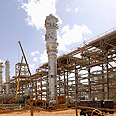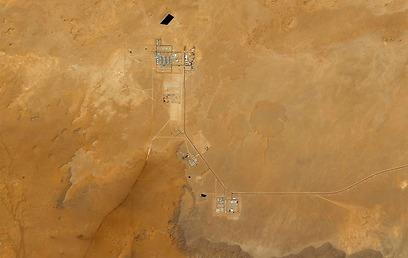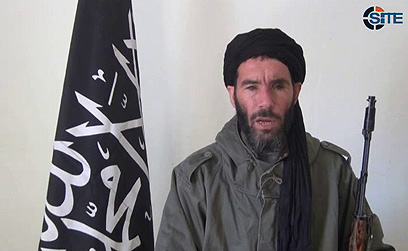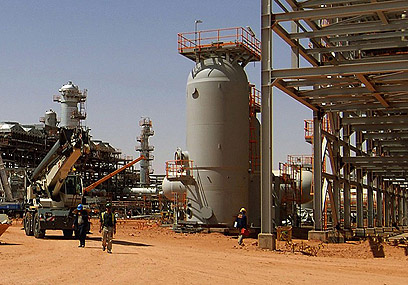
Algeria hostage rescue was rushed, experts say
Algerian op to free dozens held captive by Islamist militants at gas plant wasn't carried out by elite forces, lacked reconnaissance groundwork, Israeli officers say
The raid mounted by security forces in Algeria to free dozens of Western and local hostages held by Islamist militants appeared to have not been carried out by elite commandos, a top IDF officer said Thursday, suggesting that the authorities in the north African country did not adequately plan for the operation.
Algerian helicopters and special forces stormed a gas plant in the stony plains of the Sahara on Thursday to wipe out Islamist militants and free captives from at least 10 countries. Bloody chaos ensued, leaving the fate of the fighters and many of the hostages uncertain.
Related stories:
- 30 hostages reported killed in Algeria assault
- Algeria: 20 hostages escape, including Americans
- Militants seize foreign hostages in Algeria
Dueling claims from the military and the militants muddied the world's understanding of an event that angered Western leaders, raised world oil prices and complicated the international military operation in neighboring Mali.
At least six people, and perhaps many more, were killed – Britons, Filipinos and Algerians. Terrorized hostages from Ireland and Norway trickled out of the Ain Amenas plant, families urging them never to return.
Dozens more remained unaccounted for: Americans, Britons, French, Norwegians, Romanians, Malaysians, Japanese, Algerians and the fighters themselves. Some reports put the death toll at over 30 hostages and 11 militants.
'It's a fiasco'
Lieutenant Colonel (Res.) Doron Avital, a former commander of the elite IDF unit Sayeret Matkal, said such a hostage situation requires the authorities to first seal the compound, make contact with the abductors and ensure that the situation is stable before moving forward with a rescue operation.
"Only then can you collect intelligence and deploy forces," Avital told Ynet. "You have to reach a point in time when you can mount the best operation, while maintaining negotiations.
"It looks like in Algeria they took action immediately without thinking. It's a fiasco. They wanted to get it over with quickly, and it took heavy toll."

BP gas field. View from the top (Photo: Reuters)
The US sent an unmanned surveillance drone to the BP-operated site, near the border with Libya and 800 miles (1,290 kilometers) from the Algerian capital, but it could do little more than watch Thursday's intervention. Algeria's army-dominated government, hardened by decades of fighting Islamist militants, shrugged aside foreign offers of help and drove ahead alone.
With the hostage drama entering its second day Thursday, Algerian security forces moved in, first with helicopter fire and then special forces, according to diplomats, a website close to the militants, and an Algerian security official. The government said it was forced to intervene because the militants were being stubborn and wanted to flee with the hostages.
'Israeli forces operate globally'
The hijacking – led by a Mali-based al-Qaeda offshoot known as the Masked Brigade – served as a reminder about how complex hostage rescue operations can be, especially when the captives are foreigners.

The militants' leader (Photo: AP)
Avital said that Germany and Israel faced a similar situation during the 1972 Munich Olympics, when 11 members of the Israeli team were taken hostage and later killed.
"We wanted to act but didn't get consent from the Germans," Avital said. "We barely managed to send the chief of the Mossad there. But in these kinds of situation it's customary not to violate the sovereignty (of the host country).
"The autonomy governments need to be committed towards foreign workers," he added, referring to the situation in Algeria.
Nevertheless, Avital said Israeli commando units often operate globally. With hundreds of Israelis residing in African countries for business and scores more taking their vacations there, Israeli forces are prepared to respond to situations involvings citizens of the Jewish state.
"Israel has an indisputable capability to rescue Israeli hostages in Africa," Avital said. "Sayeret Matkal often operates outside Israel's borders so it has the platform to reach faraway places.
"In a Western country no one would let us operate, but if it's a country that is torn apart by civil war, or is in the midst of a border dispute, it is definitely within our reach."
No talks, lacking intelligence
Negotiations are a key important element of a successful rescue op, Avital added, noting that no such effort appeared to have been made in Algeria.
"Negotiations are the start of a tactical move that allows you to understand who the captors are and what they want," he said. "Here it doesn't even look like they tried to start talks. It would have allowed them to collect intelligence, organize the forces and take action."

The gas plant (Photo: AFP)
The deadly outcome in Algeria suggests the reconnaissance efforts conducted prior to the operation were lacking, according to Elik Ron, a former Israel Police chief.
"You have to achieve the element of surprise, that's the foundation," he added.
The APS news agency said some 600 local workers were safely freed in the raid – but many of those were reportedly released the day before by the militants themselves.
The militants, via a Mauritanian news website, claimed that 35 hostages and 15 militants died in the helicopter strafing. A spokesman for the Masked Brigade told the Nouakchott Information Agency in Mauritania that only seven hostages survived.
By nightfall, Algeria's government said the raid was over. But the whereabouts of the rest of the plant workers was unclear.
Algerian Interior Minister Daho Ould Kabila said the 20-odd militants entered the country from nearby Libya in three vehicles, in an operation commanded by extremist mastermind Moktar Belmoktar, who is normally based in Mali.
The militants made it clear that their attack was fallout from a French intervention in Mali. One commander, Oumar Ould Hamaha, said they were now "globalizing the conflict" in revenge for the military assault on Malian soil.
AP contributed to the report
- Receive Ynetnews updates directly to your desktop











